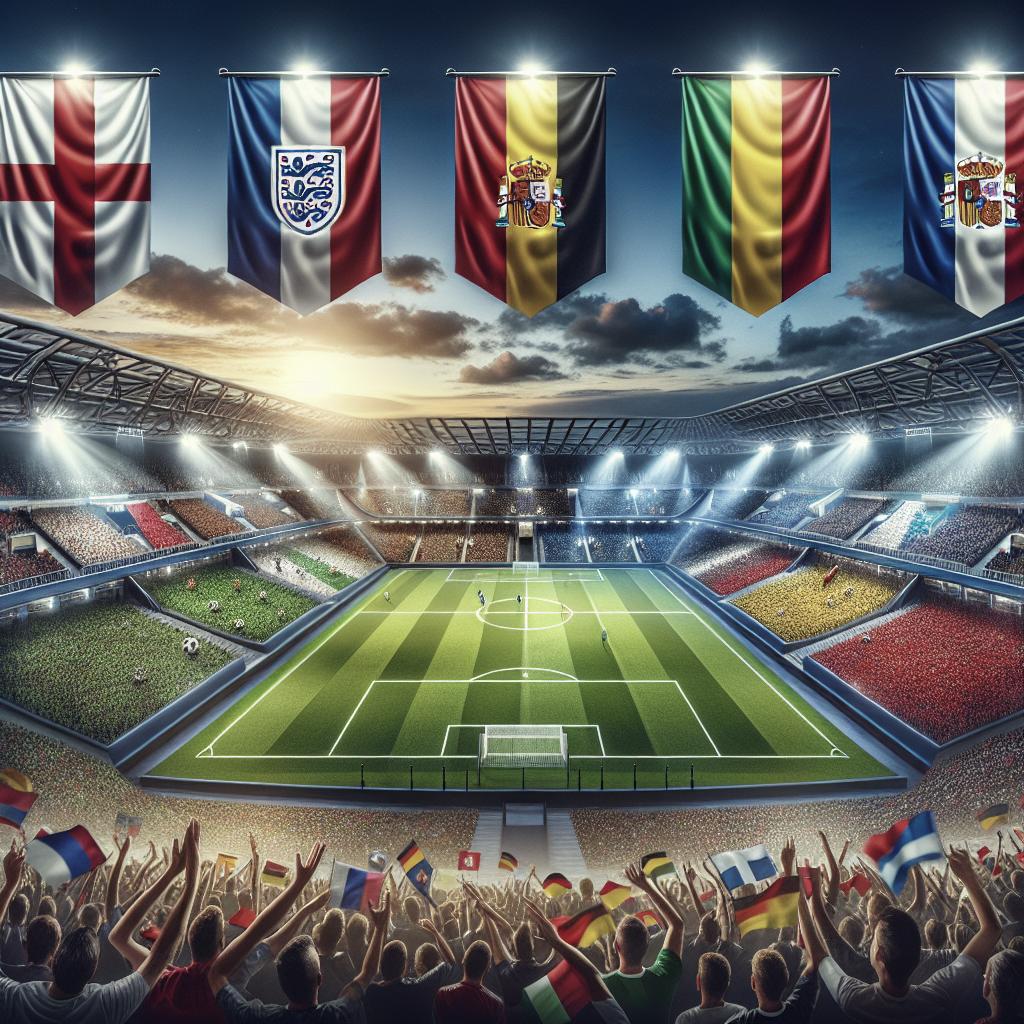Exploring Europe’s Top 5 Football Leagues
“`html
Top 5 Leagues In Europe:
When it comes to football, Europe is home to some of the most prestigious and competitive leagues in the world. The “Top 5 European Leagues” comprises France’s Ligue 1, Germany’s Bundesliga, Spain’s La Liga, Italy’s Serie A, and England’s Premier League. Each league has its own unique flair, historical significance, and a culture that has contributed to the sports’ growth and global appeal. This blog post will delve deep into these leagues, providing an insightful look into their history, standout teams, key players, and what makes them so special. Whether you’re a long-time football fan or a newcomer, this overview will give you a comprehensive understanding of why these leagues are the pinnacle of club football.
Ligue 1
Ligue 1, officially known as Ligue 1 Uber Eats for sponsorship reasons, is France’s premier football league. Established in 1932, it has been the breeding ground for some of football’s greatest talents, from Zinedine Zidane to Thierry Henry. The league operates under a promotion and relegation system with Ligue 2, its second-tier counterpart. Teams like Paris Saint-Germain (PSG), Olympique Lyonnais, and Olympique de Marseille have dominated the league, making it a hotbed for French and international talent. In recent years, Paris Saint-Germain has been the most notable team, thanks to its financial backing from Qatari investors. The club has attracted star players like Neymar Jr., Kylian Mbappe, and Lionel Messi, turning it into a force on both domestic and international fronts. However, Ligue 1 is not just about PSG; it’s renowned for its competitiveness and the quality of training facilities, contributing significantly to the national team’s success. Ligue 1 also focuses on youth development, often scouting young talents from various regions and nurturing them into world-class players. Clubs like AS Monaco and Lille OSC have been instrumental in developing young talents who go on to play in bigger leagues. The league’s emphasis on technical skills, speed, and attacking play makes it both entertaining and unpredictable.
Bundesliga
Germany’s Bundesliga is one of the most efficiently run football leagues globally, noted for its high-scoring games and fan-friendly atmosphere. Founded in 1963, the league consists of 18 teams and is unique for its “50+1” ownership rule, which ensures that the club’s members hold a majority stake, keeping clubs rooted in their local communities and traditions. Bayern Munich is the undisputed giant of the Bundesliga, with numerous national and international trophies to its name. However, other clubs like Borussia Dortmund, RB Leipzig, and Bayer Leverkusen also contribute significantly to the league’s excitement and competitiveness. Borussia Dortmund’s emphasis on developing young talent has seen stars like Jadon Sancho and Erling Haaland rise to prominence. The Bundesliga is also renowned for its state-of-the-art stadiums and passionate fans. Germany’s meticulous approach to physical fitness, tactical acumen, and a focus on youth academies has made the Bundesliga highly competitive. The league’s matches are often high-scoring affairs, and its fan culture is one of the most vibrant in Europe, making it a unique footballing experience.
La Liga
Spain’s La Liga, officially known as LaLiga Santander, is another league that boasts a rich history and intense football culture. Established in 1929, La Liga has been home to some of the best players in football history, including Diego Maradona, Cristiano Ronaldo, and Lionel Messi. Traditionally, the league has been dominated by two powerhouses: FC Barcelona and Real Madrid. Real Madrid, with its 34 La Liga titles, is one of the most famous football clubs globally, known for its “Galácticos” policy of signing superstar players. FC Barcelona, on the other hand, is renowned for its youth academy, La Masia, which has produced talents like Lionel Messi, Xavi, and Iniesta. These teams’ fierce rivalry, known as “El Clásico,” is one of the most watched and highly anticipated fixtures in global football. However, La Liga is more than just Real Madrid and Barcelona. Clubs like Atlético Madrid, Sevilla FC, and Valencia CF have also shown their prowess both domestically and in European competitions. La Liga is famous for its technical style of play and intricate passing, often described as “tiki-taka” football, making it a fascinating league to follow for purists of the game.
Serie A
Italy’s Serie A, one of the oldest football leagues in the world, was founded in 1898. It’s renowned for its tactical depth and defensive rigor, earning the nickname “catenaccio.” Serie A has been a stage for legendary players like Paolo Maldini, Francesco Totti, and more recently Cristiano Ronaldo. The league’s rich history is decorated with multiple World Cup-winning players, illustrating its enduring influence on the global soccer stage. Juventus has been the most dominant force in Serie A, winning numerous titles, particularly in the past decade. However, Inter Milan and AC Milan, two of Europe’s most storied clubs, have also enjoyed significant success, both domestically and in European competitions. These clubs contribute to the league’s competitive environment and offer a diverse range of styles and tactical battles. Serie A has also seen a revitalization in recent years, with improved performances in European competitions and an influx of young talents and high-quality foreign players. Clubs like Napoli, AS Roma, and Atalanta have increasingly closed the gap with the traditional giants, making Serie A one of the most unpredictable and thrilling leagues in European football.
Premier League
The English Premier League (EPL) is often regarded as the most competitive and popular football league in the world. Founded in 1992, the Premier League has not only transformed English football but has also had a global impact, attracting talents from every corner of the world. The league features 20 clubs, including global behemoths like Manchester United, Liverpool, and Chelsea, making it a melting pot of footballing talent and cultures. What sets the Premier League apart is its competitiveness. Unlike other leagues where a few clubs dominate, the EPL often sees multiple teams contending for the title. In recent years, Manchester City has emerged as a dominant force under Pep Guardiola, while Liverpool’s resurgence under Jürgen Klopp has also been notable. Tottenham Hotspur, Arsenal, and Leicester City, who remarkably won the league in the 2015-2016 season, have all contributed to dramatic and unpredictable league seasons. The Premier League is known for its fast-paced, physical style of play, and its grand stadiums are packed with passionate fans every weekend. The league’s broadcasting deals bring in billions, allowing clubs to invest heavily in infrastructure and talent. This commercial success, along with exhilarating football, makes the EPL the epitome of football leagues globally.
Next Steps
Here is a summary table of the top 5 European leagues discussed:
| League | Country | Notable Teams | Characteristics |
|---|---|---|---|
| Ligue 1 | France | PSG, Olympique Lyonnais, AS Monaco | Youth development, technical play, competitiveness |
| Bundesliga | Germany | Bayern Munich, Borussia Dortmund, RB Leipzig | Fan-friendly, high-scoring, youth academies |
| La Liga | Spain | Real Madrid, FC Barcelona, Atlético Madrid | Technical style, historical significance, “tiki-taka” |
| Serie A | Italy | Juventus, Inter Milan, AC Milan | Tactical depth, defensive rigor, historic influence |
| Premier League | England | Manchester United, Liverpool, Chelsea | Competitiveness, global appeal, fast-paced play |
“` In this blog post, I’ve aimed to provide an engaging and informative overview of the top 5 European football leagues. Understanding the unique characteristics, prominent teams, and historical significance of each league will enrich your appreciation of football and keep you updated with current trends. Happy watching, and may your favorite team triumph!


